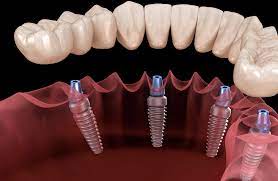When it comes to replacing missing teeth, many patients wonder about the benefits of choosing dental implants over dentures. While both options restore function and appearance, dental implants offer a more permanent and natural-feeling solution. Dental implants are surgically placed into the jawbone, creating a stable foundation for artificial teeth, while dentures rest on the gums and may require adhesives. For long-term comfort and oral health, implants often prove to be the superior choice.
Superior Comfort and Stability:
One of the most noticeable benefits of choosing dental implants over dentures is the comfort they provide. Implants are securely anchored into the jawbone, which eliminates many of the issues associated with removable dentures. Patients report:
- No slipping or movement while eating or speaking
- Natural sensation similar to real teeth
- No need for adhesives or constant repositioning
- Reduced gum irritation compared to ill-fitting dentures
This stability translates to increased confidence in daily activities like talking, laughing, and chewing.
Long-Term Durability and Cost-Effectiveness:
While the initial cost of implants may be higher, they are a long-term investment in oral health. Dentures typically need to be replaced or adjusted every 5 to 7 years, while implants can last decades with proper care. The financial and functional benefits include:
- Durability that often lasts a lifetime
- Fewer replacements and adjustments over the years
- Lower long-term maintenance costs
- Less risk of damage or breakage compared to dentures
Over time, implants can be more cost-effective and reliable than traditional denture options.
Better Jawbone Health and Facial Structure:
Another important reason patients choose implants is to prevent jawbone loss. When teeth are missing, the jawbone begins to deteriorate due to lack of stimulation. Implants mimic natural tooth roots, which helps preserve the bone and maintain facial shape. Key advantages include:
- Stimulation of jawbone growth through everyday use
- Reduced bone resorption, preserving oral health
- Maintenance of natural facial contours, avoiding the sunken appearance caused by dentures
- Improved support for surrounding teeth, preventing shifting
This biological integration sets implants apart from surface-level solutions like dentures.
Improved Chewing and Speaking Ability:
One of the practical benefits of choosing dental implants over dentures is the improvement in everyday functions. Dentures may slip or affect speech, while implants perform more like natural teeth. This enhances quality of life with:
- Stronger bite force to enjoy a wider variety of foods
- No movement while chewing, allowing confident eating
- Clearer speech without clicking or slipping
- Greater ease in pronunciation, especially for certain sounds
These factors contribute to better digestion, nutrition, and communication.
Natural Appearance and Confidence Boost:
Dental implants Treatment are custom-designed to blend in with the surrounding teeth. Unlike dentures that may appear bulky or artificial, implants offer a realistic look and feel. Patients often experience:
- Improved self-esteem due to restored smiles
- Customized crowns that match natural tooth color and shape
- Seamless integration with surrounding teeth
- Freedom from worry about dentures falling out
This natural appearance enhances personal confidence in both social and professional settings.
Easy Maintenance and Oral Hygiene:
Implants are easy to care for and fit into a standard oral hygiene routine. They don’t require soaking or special cleansers like dentures. With simple maintenance, they remain healthy and functional. Daily care includes:
- Brushing twice daily with a soft-bristled toothbrush
- Flossing around the implant using regular or interdental floss
- Routine dental checkups for professional cleaning and inspection
- Avoiding hard foods immediately after placement, then eating normally
This convenience supports long-term oral health and simplifies daily care.





Comments